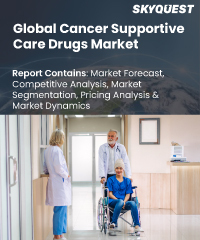
Report ID: SQMIG35I2226

Report ID:
SQMIG35I2226 |
Region:
Global |
Published Date: February, 2024
Pages:
157
|
Tables:
71 |
Figures:
80
Cancer Supportive Care Drugs Market Drivers
Rising Cancer Incidence:
Developments in Cancer Treatment:
Cancer Supportive Care Drugs Market Restraints
Expensive Medical Care:
Regulatory Challenges:
Our industry expert will work with you to provide you with customized data in a short amount of time.
REQUEST FREE CUSTOMIZATIONWant to customize this report? This report can be personalized according to your needs. Our analysts and industry experts will work directly with you to understand your requirements and provide you with customized data in a short amount of time. We offer $1000 worth of FREE customization at the time of purchase.

Report ID: SQMIG35I2226